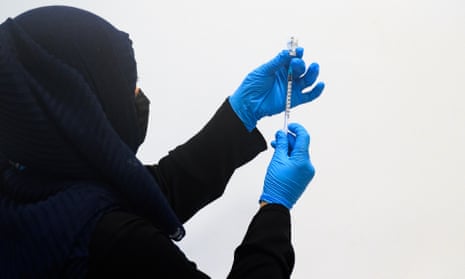People from minority ethnic backgrounds are less likely to take the coronavirus vaccine, according to polling for the Royal Society for Public Health.
Three-quarters (76%) of the 2,076 UK adults polled said they would take a Covid jab if advised to by their GP or another health professional, but among respondents from black, Asian and minority ethnic (BAME) backgrounds the proportion fell to 57%. For white respondents the figure was 79%.
However, among BAME respondents who were not willing to be vaccinated, 35% said they were likely to change their minds and get the jab if their GP gave them more information, compared with 18% of white people who were initially unwilling.
The RSPH chief executive, Christina Marriott, said the results of the polling were highly concerning but unsurprising. “We have known for years that different communities have different levels of satisfaction in the NHS and more recently we have seen anti-vaccination messages have been specifically targeted at different groups, including different ethnic or religious communities,” she said.
“But these are exactly the groups which have suffered most through Covid.
“They continue to be most at risk of getting ill and most at risk of dying. So the government, the NHS and local public health must rapidly and proactively work with these communities.”
Quick GuideWhen will I get offered the vaccine in the UK?
Show
The government’s joint committee on vaccination and immunisation published a list of groups of to be prioritised to receive a vaccine for Covid-19 in the UK. The list is:
1. residents in a care home for older adults and their carers
2. all those 80 years of age and over and frontline health and social care workers
3. all those 75 years of age and over
4. all those 70 years of age and over and clinically extremely vulnerable individuals
5. all those 65 years of age and over
6. all individuals aged 16 years to 64 years with underlying health conditions which put them at higher risk of serious disease and mortality
7. all those 60 years of age and over
8. all those 55 years of age and over
9. all those 50 years of age and over
As of 27 February 2021, at least 20 million adults had received one or more doses of a vaccine.
Once all the top nine priority groups have been offered at least one jab, it will then be given out to the rest of the adult population according to their age group. The age ranges, who expect to be invited for vaccination from around mid-April, are:
1.all those aged 40-49 years
2. all those aged 30-39 years
3. all those aged 18-29 years
Some have argued that there should be prioritisation according to people in vulnerable professions or from ethnicities facing a disproportionate effect from the virus, however the government has countered that to collect and act on this data will take longer than simply using existing NHS data on age.
Numerous studies have shown Covid death rates in the UK for most ethnic minorities to be higher – significantly so in some cases – compared with white ethnic groups. A report published on Tuesday by parliament’s women and equalities committee found one of the causes of the disparity to be “entrenched health inequalities”.
The poll for the RSPH, carried out by Yonder between 4 and 6 December, found confidence was lowest among respondents of Asian ethnicity, with 55% likely to say yes to a jab.
Jabeer Butt, the chief executive of the Race Equality Foundation, said: “These findings are not surprising in light of past experience of the reach of vaccines to BAME communities, but they appear to be particularly worrying as it suggests the Covid vaccine may not reach communities that have been disproportionately impacted.
“It is imperative that the NHS uses trusted channels like BAME-led voluntary organisations to reach and address concerns of BAME communities and ensure that the disproportionate impact of Covid is not exacerbated.”
People on lower incomes are also less likely to take the vaccine, according to the polling, with 70% of the lowest earners saying they were likely to do so, compared with 84% of the highest earners. The RSPH said this should also be of concern to the government, given death rates from Covid in the poorest areas have been more than double those in better-off areas.
The poll found that men (80%) were more likely to get the jab than women (73%). Overall, just 8% of those surveyed said they would be very unlikely to take a coronavirus vaccine.
Nadhim Zahawi, the government minister responsible for Covid vaccine deployment, said: “All vaccines go through a robust clinical trial process and are only given to patients once they have met the strict safety, effectiveness and quality standards of the UK’s medicines regulator, the MHRA.
“The NHS will provide advice and information at every possible opportunity, including working closely with BAME communities, to support those receiving a vaccine and to anyone who has questions about the vaccination process.”
